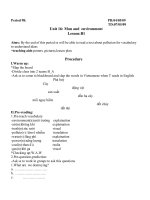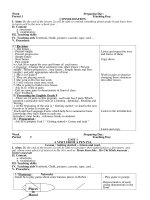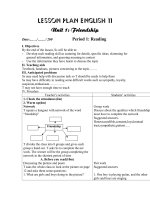Lecture Discovering nutrition - Chapter 9: Nutrition for physical performance
Bạn đang xem bản rút gọn của tài liệu. Xem và tải ngay bản đầy đủ của tài liệu tại đây (2.12 MB, 35 trang )
Chapter 9
Nutrition for
Physical
Performance
Nutrition and Physical
Performance
•
•
“Exercise is medicine”
Physical fitness
– Cardiorespiratory fitness
– Muscular strength
– Muscular endurance
– Body composition
– Flexibility
Energy Systems, Muscles, and
Physical Performance
•
ATP-CP energy system
– Quick source of ATP
•
Cellular ATP and creatine phosphate
– Fuel for 3 to 15 seconds of maximal
effort
•
Energy Systems,
Muscles, and Physical
Performance
Lactic Acid
Energy System
–
–
Breakdown of glucose to
lactic acid (lactate)
•
Doesn’t require
oxygen
Rise in acidity triggers
muscle fatigue
•
Energy Systems,
Muscles, and Physical
Performance
Oxygen Energy System
– Breakdown of
carbohydrate
and fat for energy
•
Requires oxygen
•
Produces ATP more
slowly
Energy Systems, Muscles, and
Physical Performance
•
•
Teamwork in Energy Production
– Anaerobic systems
– Aerobic systems
Glycogen Depletion
– Steady drop for first 1.5 hours
– Entirely depleted ~ 3 hours
Energy Systems, Muscles, and
Physical Performance
•
Endurance Training
– Decreases reliance on anaerobic
systems
– Extends availability of glycogen
Energy Systems, Muscles, and
Physical Performance
•
Muscles and Muscle
Fibers
– Slow-twitch fibers
– Fast-twitch fibers
•
Relative
proportion
determined by
genetics
Optimal Nutrition for
Exercise Performance
•
General recommendations
– Consume adequate energy to maintain
weight and health
– Daily weigh-ins are discouraged
– Protein recommendations 1.2-1.7 g/kg
– Fat intake 20-35% of total energy intake
Optimal Nutrition for
Exercise Performance
•
General recommendations
– Risk for micronutient deficiencies
– Adequate fluid intake before, during and
after exercise is important
– No vitamin and mineral supplements are
required if athlete consumes adequate
energy from various foods
Energy Intake and Exercise
•
Energy needs
– Fuel for training
– Maintain healthy weight
– Support growth (if adolescent)
– May require frequent meals and snacks
Carbohydrate and Exercise
•
•
High-carbohydrate
diets
– Increase glycogen
stores
– Extend endurance
Carbohydrate loading
– 60–70% of calories
as carbohydrate
– Decrease exercise
intensity prior to
competition
Carbohydrate and Exercise
•
Carbohydrate intake
– Before exercise
•
Easily digested foods/beverages
– Pre-exercise meals and glycemic index
•
Measure food to monitor its effects,
which can raise blood glucose
Carbohydrate and Exercise
•
Carbohydrate intake
– During exercise
•
Sports drinks (4–8% carbohydrate)
– After exercise
•
Replenish glycogen stores
– 1 to 1.5 grams carbohydrate per kg
both 30 minutes and 2 hours after
exercise
Dietary Fat and Exercise
•
Fat Intake
– Major fuel source for endurance
activities
– High-fat diet not needed
– Recommendations
•
Moderate fat intake: 20–35% of
calories
•
Limit saturated fat to less than 10% of
energy
•
Avoid trans fat as much as possible
Protein and Exercise
•
•
•
•
Protein Recommendations
– Adults: 0.8 grams per kg body weight
– Endurance athletes: 1.2–1.7 g/kg
– Resistance-trained athletes: 1.6–1.7
g/kg
Protein Sources
– Foods: lean meats, fish, low-fat dairy,
and egg whites
Protein Intake After Exercise
– Helps replenish glycogen
Dangers of high-protein intake









